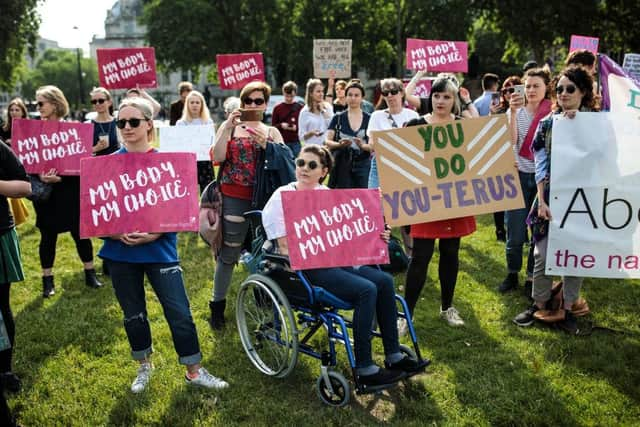Abortion Scotland: What does Scots law say about illegal abortion in wake of mother-of-three being jailed? Can a woman be jailed for an abortion in Scotland?
Here we explain the details of abortion legislation.
What does Scottish law say about abortions?
Scotland’s abortion law is underpinned by common law – that is, law set by previous judgements in Scottish courts.; But it is set by the statutory 1967 Abortion Act, which outlines the circumstances in which abortion is legal in England, Wales and Scotland.


Introduced as a private member’s Bill by future Liberal Party leader and Scottish Lord David Steel, the act necessitates that two doctors certify that a woman meets one of the grounds for an abortion, that the abortion takes place in an NHS hospital or licensed premises, and that the abortion is directed by a registered medical practitioner.
Advertisement
Hide AdAdvertisement
Hide AdThe Act also allows for conscientious objection if a medical professional refuses to take part in an abortion – but they must then refer that person to another healthcare provider.
The law leaves in the hands of the Minister for Health decisions regarding licensed premises – most recently used to legalise – or potentially in future, remove – access to telemedical abortion.
The 1967 Act did not, however, provide a time limit on abortion, and so the older Infant Life (Preservation) Act of 1929 was used, which set out the punishments for aborting “a child capable of being born alive”. The century-old Act set the gestation time for a viable birth at 28 weeks.


The Human Fertilisation and Embryology Act 1990 reduced the time limit further, to 24 weeks, but added that abortion was legal if the continuance of the pregnancy would cause “injury to the physical or mental health of the pregnant woman or any existing children of her family”, or if the child “would suffer from such physical of mental abnormalities as to be seriously handicapped”.
What changes do campaigners want to be made to the law around abortion?
There are now several charities in Scotland campaigning for the decriminalisation of abortion, amid fears women could be prosecuted if they access healthcare outside of the limitations of the law – as has happened recently in England.
Prior to the introduction of the Abortion Act, provision of abortion in Scotland varied significantly, with the north east of Scotland carrying out a substantial number of procedures, while Glasgow declined to provide almost any.
However, it did place limitations on provisions which the previously underlying common law did not require.
It requires two doctors to approve every abortion and, according to the British Pregnancy Advisory Service, “it limits the role of nurses and midwives in the direction of care provided under the Act, and it shaped the role and understanding of providers such that there is now nowhere in Scotland where any doctor, despite a lack of formal criminalisation, would seek to provide much-needed care to a woman in a way that contravened the provisions of the Act”.
Advertisement
Hide AdAdvertisement
Hide AdThe decriminalisation of abortion in Scotland may also have the unintended effects of removing the legal protection for conscientiously objecting physicians, and the removal of time limits.
What are the chances of a woman being jailed in Scotland over an abortion?
The chances of a woman being prosecuted in Scotland appear to be low, however, for two reasons.
Firstly, the woman who was prosecuted in England, 44-year-old Carla Foster, was sentenced under the Offences Against the Person Act 1861. In Scotland, a person who strayed outside of the exemptions of the Abortion Act 1967 would be punished under Scottish common law.
As mentioned earlier, common law is set by precedent, not by an act of Parliament, which leads us to the second point – there has not been a prosecution of a woman in Scotland for seeking an abortion, nor of a medical professional performing a therapeutic abortion, meaning the chances of a successful prosecution are slim.
There has, however, been prosecution of people providing ‘backstreet abortions’, with the last case being a medic who carried out procedures in a room in their home, in 1967 – coincidentally the same year the Abortion Act was introduced.